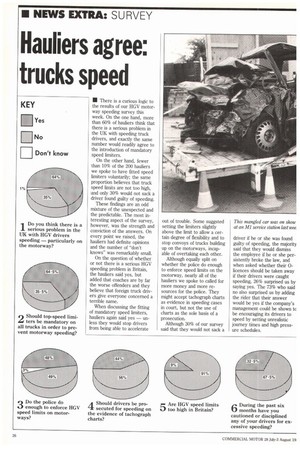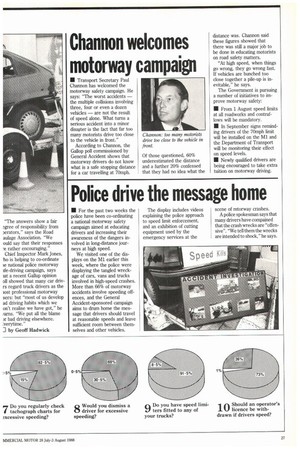Hauliers agree: trucks speed
Page 22

Page 23

If you've noticed an error in this article please click here to report it so we can fix it.
• There is a curious logic to the results of our HGV motorway speeding survey this week. On the one hand, more than 60% of hauliers think that there is a serious problem in the UK with speeding truck drivers, and exactly the same number would readily agree to the introduction of mandatory speed limiters.
On the other hand, fewer than 10% of the 200 hauliers we spoke to have fitted speed limiters voluntarily; the same proportion believes that truck speed limits are not too high, and only 30% would not sack a driver found guilty of speeding.
These findings are an odd mixture of the unexpected and the predictable. The most interesting aspect of the survey, however, was the strength and conviction of the answers. On every point we raised, the hauliers had definite opinions and the number of "don't knows" was remarkably small.
On the question of whether or not there is a serious HGV speeding problem in Britain, the hauliers said yes, but added that coaches are by far the worse offenders and they believe that foreign truck drivers give everyone concerned a terrible name.
When discussing the fitting of mandatory speed limiters, hauliers again said yes — unless they would stop drivers from being able to accelerate out of trouble. Some suggsted setting the limiters slightly above the limit to allow a certain degree of flexibility and to stop convoys of trucks building up on the motorways, incapable of overtaking each other.
Although equally split on whether the police do enough to enforce speed limits on the motorway, nearly all of the hauliers we spoke to called for more money and more resources for the police. They might accept tachograph charts as evidence in speeding cases in court, but not the use of charts as the sole basis of a prosecution.
Although 30% of our survey said that they would not sack a driver if he or she was found guilty of speeding, the majority said that they would dismiss the employee if he or she persistently broke the law, and when asked whether their 0licences should be taken away if their drivers were caught speeding, 26% surprised us by saying yes. The 73% who said no also surprised us by adding the rider that their answer would be yes if the company's management could be shown tc be encouraging its drivers to speed by setting unrealistic journey times and high pressure schedules. "The answers show a fair ?:gree of responsibility from )erators," says the Road adage Association. "We ould say that their responses -e rather encouraging."
Chief Inspector Mark Jones, fio is helping to co-ordinate le national police motorway ge-driving campaign, says lat a recent Gallup opinion oil showed that many car drivrs regard truck drivers as the lost professional motorway sers: but "most of us develop ad driving habits which we on't realise we have got," he yarns. "We put all the blame r bad driving elsewhere. :verytime."
by Geoff Hadwick








































































